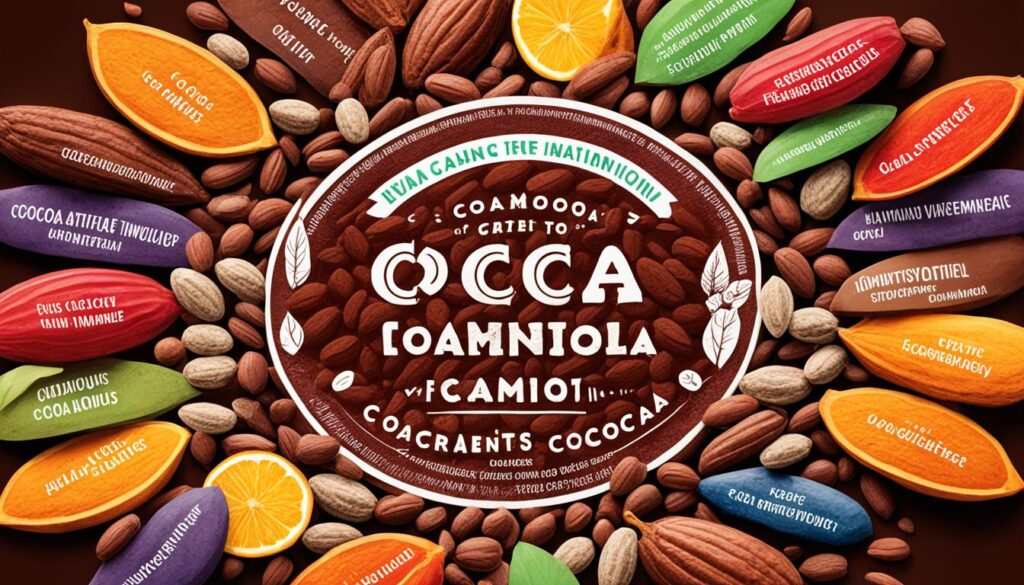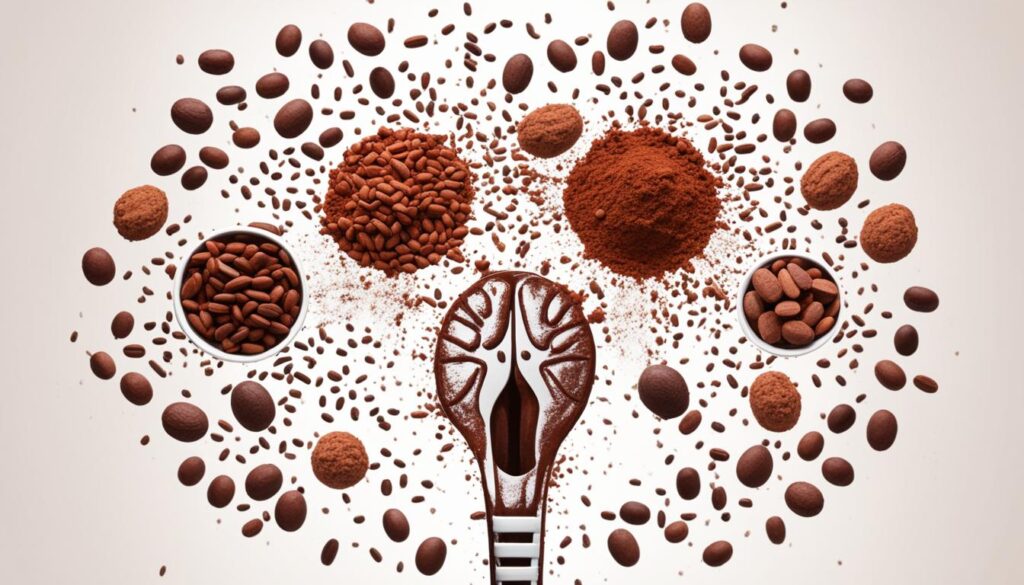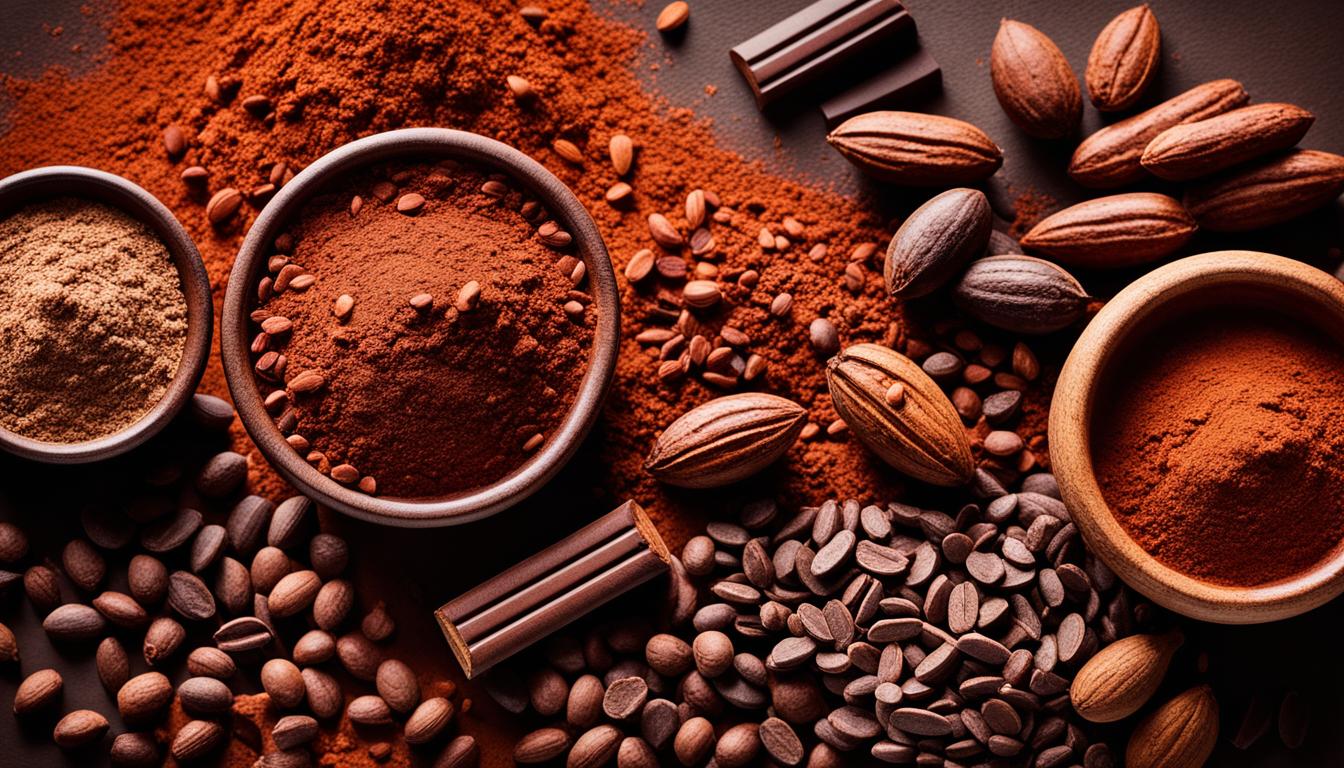Cocoa, derived from the cacao bean, has gained attention for its potential benefits on immune function. Studies suggest that the rich antioxidant content and bioactive compounds in cocoa may enhance immune cell activity, reduce inflammation, and support overall immune health. This article explores the various effects of cocoa on the immune system, providing an in-depth look at the science behind these potential benefits.
Key Takeaways
- Cocoa is rich in antioxidants and bioactive compounds that may enhance immune function.
- Cocoa’s anti-inflammatory properties can potentially support overall immune health.
- Emerging research suggests that cocoa may positively impact immune cell activity and responses.
- Incorporating cocoa into a healthy diet may offer benefits for the immune system.
- Further research is needed to fully understand the extent of cocoa’s effects on the immune system.
Introduction to Cocoa and Its Potential Benefits
Cocoa, the key ingredient in the beloved treat of chocolate, is derived from the seeds of the cacao tree. This versatile substance has a rich history, as cultures around the world have long recognized the potential health benefits of cocoa and cacao in traditional medicine practices. From supporting immune function to promoting overall well-being, the intriguing properties of this natural resource have captivated researchers and health enthusiasts alike.
What is Cocoa?
Cocoa, also known as cacao, is a product derived from the seeds of the Theobroma cacao tree. This tropical plant, native to Central and South America, has been cultivated for centuries and its seeds have been extensively utilized in various culinary and medicinal applications. The complex flavor and aroma of cocoa have made it a staple ingredient in the production of chocolate, but its potential health benefits extend far beyond its use in the confectionery industry.
Cocoa’s Role in Traditional Remedies
Across many cultures, cocoa and cacao have been revered for their potential health benefits and have been incorporated into traditional medicine practices. Indigenous communities in Central and South America, for example, have long used cocoa in various forms to address a range of ailments and support overall well-being. The rich history of cocoa in traditional medicine underscores the sustained interest in its therapeutic properties and the potential for further exploration of its versatile applications.
Cocoa’s Nutritional Profile

Cocoa, the key ingredient in chocolate, is a remarkable source of essential nutrients and bioactive compounds that have garnered increasing attention for their potential health benefits. At the heart of cocoa’s nutritional profile lie its impressive antioxidant content and the presence of flavonoids, both of which play a crucial role in supporting immune function.
Antioxidants in Cocoa
One of the most striking features of cocoa is its exceptional antioxidant capacity. In fact, cocoa contains a higher concentration of antioxidants, such as polyphenols, than many other commonly consumed foods. These antioxidants play a vital role in neutralizing harmful free radicals, reducing oxidative stress, and potentially enhancing the body’s immune response.
Flavonoids and Their Importance
Cocoa is also a rich source of flavonoids, a class of plant-based compounds known for their potent antioxidant and anti-inflammatory properties. These flavonoids, including compounds like epicatechin and procyanidins, have been extensively studied for their ability to support overall immune function and maintain a healthy inflammatory response within the body.
| Nutrient | Concentration in Cocoa |
|---|---|
| Antioxidants | Higher than many other foods |
| Flavonoids | Abundant, including epicatechin and procyanidins |
| Polyphenols | Significant levels, contributing to the antioxidant profile |
| Minerals | Rich in magnesium, iron, and copper |
| Fiber | Contains a notable amount of dietary fiber |
Cocoa and Inflammation

Inflammation is a crucial component of the immune response, and chronic inflammation has been linked to various health concerns. Interestingly, research suggests that the bioactive compounds found in cocoa, such as flavonoids, possess potent anti-inflammatory properties. By reducing inflammation, cocoa may positively influence immune function and overall health.
Anti-inflammatory Properties of Cocoa
The cocoa plant is rich in a variety of polyphenolic compounds, including flavonoids, which have been extensively studied for their ability to modulate the inflammatory response. These bioactive compounds in cocoa have demonstrated the capacity to inhibit the production of pro-inflammatory mediators, such as cytokines and eicosanoids, which play a central role in the inflammatory cascade.
Furthermore, the anti-inflammatory effects of cocoa may be attributed to its ability to regulate the activity of key enzymes involved in the inflammatory process, such as cyclooxygenase (COX) and lipoxygenase (LOX). By modulating these enzymes, cocoa can help reduce the overall inflammatory response, potentially contributing to improved immune function and overall well-being.
Numerous studies have explored the relationship between cocoa consumption and markers of inflammation. The findings suggest that regular intake of cocoa-containing products, such as dark chocolate or cocoa powder, may lead to a measurable reduction in inflammatory biomarkers, including C-reactive protein (CRP) and various cytokines.
The anti-inflammatory properties of cocoa have far-reaching implications, as chronic inflammation is associated with a wide range of health conditions, including cardiovascular disease, type 2 diabetes, and certain neurological disorders. By addressing the underlying inflammatory processes, cocoa may potentially contribute to the prevention and management of these inflammatory-driven health concerns.
Cocoa and Immune Cell Function

The human immune system is a complex network of specialized cells, including white blood cells, that work tirelessly to defend the body against potential threats. Emerging research suggests that cocoa and its bioactive compounds may have a direct impact on the function of these vital immune cells.
Impact on White Blood Cells
White blood cells, also known as leukocytes, play a crucial role in the body’s immune response. Studies have indicated that the antioxidants and flavonoids found in cocoa may have a positive influence on the activity and function of these white blood cells. Researchers have observed that the consumption of cocoa can enhance the ability of white blood cells to detect and respond to potential pathogens, potentially strengthening the overall immune defense.
Enhancing Immune Cell Responses
Beyond the effects on white blood cells, cocoa and its bioactive compounds may also have the potential to enhance the responses of other key immune cells. The antioxidant and anti-inflammatory properties of cocoa have been linked to improved immune cell function, including the activation and proliferation of white blood cells and the modulation of immune responses. This suggests that incorporating cocoa into a balanced diet may offer a natural way to support the body’s immune system and its ability to respond effectively to potential threats.
What are the effects of cocoa on immune function?

Cocoa, with its rich antioxidant content and bioactive compounds, has been the subject of growing research for its potential effects on immune function. The antioxidants found in cocoa, including flavonoids, may contribute to its ability to support the immune system. By reducing inflammation and enhancing immune cell activity, cocoa may play a role in maintaining overall immune health and function.
Studies suggest that the antioxidants in cocoa can help modulate the immune response, potentially boosting the activity of immune cells, such as white blood cells, that are crucial for defending the body against threats. The anti-inflammatory properties of cocoa may also contribute to its beneficial effects on the immune system, as chronic inflammation has been linked to various health concerns.
Furthermore, the bioactive compounds in cocoa may help enhance the function of immune cells, enabling them to more effectively detect and respond to potential pathogens or threats. This suggests that incorporating cocoa into a balanced diet may provide a natural way to support immune function and overall well-being.
While the research on the specific mechanisms by which cocoa influences immune function is ongoing, the available evidence points to its potential as a valuable addition to a healthy lifestyle, offering a multifaceted approach to supporting the body’s defense systems.
Cocoa and Cardiovascular Health

In addition to its potential benefits on immune function, cocoa has also been extensively studied for its positive impact on cardiovascular health. Emerging research suggests that the bioactive compounds found in cocoa, such as flavonoids, may help improve the function of blood vessels, which can have a significant influence on overall cardiovascular well-being.
Improved Blood Vessel Function
One of the key ways in which cocoa may support cardiovascular health is through its ability to enhance the function of blood vessels. Studies have shown that the flavonoids in cocoa can help improve the flexibility and dilation of blood vessels, allowing for better blood flow and reduced strain on the heart. This improved vascular function can contribute to a healthier cardiovascular system, potentially reducing the risk of conditions like high blood pressure, atherosclerosis, and heart disease.
The antioxidant properties of cocoa are thought to play a crucial role in these beneficial effects on blood vessels. The flavonoids in cocoa can help neutralize harmful free radicals, reducing oxidative stress and inflammation, which are known to impair vascular function. By mitigating these damaging factors, cocoa may support the overall health and resilience of the cardiovascular system.
Furthermore, research suggests that the consumption of cocoa may also have a positive impact on other markers of cardiovascular health, such as cholesterol levels and blood pressure. While the exact mechanisms are still being explored, the growing body of evidence indicates that incorporating cocoa into a balanced diet may offer valuable benefits for maintaining a healthy heart and circulatory system.
Cocoa and Cognitive Function

Interestingly, emerging research suggests that cocoa, with its rich array of flavonoids and other bioactive compounds, may hold intriguing potential for supporting cognitive function and brain health. Several studies have indicated that the consumption of cocoa or cocoa-derived products may have neuroprotective properties and can enhance various aspects of mental performance.
One of the key mechanisms by which cocoa may benefit cognitive function is through its antioxidant and anti-inflammatory effects. The flavonoids present in cocoa have been shown to possess the ability to cross the blood-brain barrier, where they can help mitigate oxidative stress and reduce neuroinflammation. This, in turn, may contribute to the preservation of neuronal integrity and the enhancement of cognitive abilities.
Furthermore, some research has linked the consumption of cocoa to improved blood flow and increased cerebral blood volume, which can enhance the delivery of oxygen and nutrients to the brain. This improved cerebral perfusion may support cognitive functions such as memory, attention, and information processing.
| Cognitive Benefit | Potential Mechanisms |
|---|---|
| Memory Enhancement | Increased blood flow, neuroprotection, and improved synaptic plasticity |
| Improved Attention and Focus | Enhanced neurotransmitter function and reduced neuroinflammation |
| Enhanced Information Processing | Improved cerebral blood flow and increased brain-derived neurotrophic factor (BDNF) levels |
While the research on the relationship between cocoa and cognitive function is still evolving, the available evidence suggests that incorporating cocoa or cocoa-rich foods into a balanced diet may offer potential benefits for brain health and mental performance. As with any dietary intervention, it is essential to consult with healthcare professionals to determine the appropriate intake and to consider individual circumstances.
Incorporating Cocoa into a Healthy Diet

To unlock the potential benefits of cocoa for your health, it’s important to understand the various forms in which it can be incorporated into a healthy diet. From dark chocolate to cocoa powder and cocoa nibs, there are several cocoa products to explore and enjoy.
Types of Cocoa Products
Dark chocolate is an excellent source of cocoa, providing a rich, indulgent way to consume the beneficial compounds found in this superfood. Look for dark chocolate with a high cocoa content, typically 70% or more, to maximize the potential health benefits.
Cocoa powder is another versatile cocoa product that can be easily added to a variety of dishes and beverages, from smoothies to baked goods. Opt for unsweetened cocoa powder to avoid excessive added sugars.
Cocoa nibs, the unprocessed pieces of the cacao bean, offer a crunchy and nutrient-dense way to incorporate cocoa into your diet. These can be sprinkled on top of yogurt, oatmeal, or even used as a topping for salads and other savory dishes.
Recommended Intake
When it comes to recommended intake of cocoa for optimal health benefits, the research suggests that moderation is key. Studies have shown that consuming 20-30 grams of cocoa per day can contribute to positive outcomes, such as improved blood pressure, cholesterol levels, and cardiovascular health.
It’s important to note that the recommended intake may vary depending on individual factors, such as age, weight, and overall health status. Consult with a healthcare professional to determine the appropriate cocoa intake for your specific needs.
| Cocoa Product | Recommended Daily Intake |
|---|---|
| Dark Chocolate (70% or higher cocoa content) | 20-30 grams |
| Cocoa Powder (unsweetened) | 1-2 tablespoons |
| Cocoa Nibs | 1-2 tablespoons |
By incorporating these cocoa products into a balanced and healthy diet, you can potentially enjoy the various health benefits associated with this remarkable superfood.
Potential Side Effects and Considerations

While cocoa can offer potential health benefits, it’s crucial to be aware of any potential side effects or considerations. One important factor to consider is the caffeine content in cocoa. Cocoa and chocolate contain varying amounts of caffeine, which can have stimulant effects and may not be suitable for individuals sensitive to caffeine or those with certain medical conditions.
Caffeine Content
The caffeine content in cocoa products can range from trace amounts to significant levels, depending on the specific type and processing methods. Individuals who are sensitive to caffeine or have conditions such as anxiety, insomnia, or heart problems may need to be cautious with their cocoa consumption and monitor their intake accordingly.
Oxalate Levels
Another potential concern with cocoa consumption is the relatively high oxalate levels found in cocoa products. Oxalates can be problematic for individuals with a history of kidney stones or other health conditions that are sensitive to oxalate intake. These individuals may need to limit their cocoa consumption or opt for low-oxalate cocoa alternatives.
Additionally, some individuals may experience allergic reactions to cocoa or its components, such as milk or other ingredients in cocoa-based products. It’s important to be mindful of any personal sensitivities or allergies and to consult with a healthcare professional before significantly increasing cocoa intake.
Research Gaps and Future Directions
As the scientific community continues to explore the potential benefits of cocoa on immune function, it is important to acknowledge the existing research gaps and limitations. Many of the current studies have been relatively small in scale, with short-term durations, making it challenging to draw definitive conclusions about the long-term effects of cocoa on the immune system.
Limitations of Current Studies
One of the primary limitations of the existing research is the need for more robust, large-scale, and long-term investigations. Studies with larger sample sizes and extended follow-up periods would provide more reliable and comprehensive insights into the relationship between cocoa and immune function. Additionally, the diversity of cocoa products and their processing methods may contribute to the variability in research findings, underscoring the need for standardized protocols and controls.
Areas for Further Investigation
As the research in this field continues to evolve, there are several areas that warrant further exploration. Investigating the specific mechanisms by which the bioactive compounds in cocoa, such as flavonoids and antioxidants, interact with and modulate the immune system would be a valuable area of focus. Additionally, exploring the potential synergistic effects of cocoa with other dietary components or lifestyle factors could uncover new insights into its immunomodulatory properties.
Another promising avenue for future research is the evaluation of cocoa‘s effects on various immune-related health conditions, such as autoimmune disorders, allergies, and infections. Examining the potential of cocoa as a complementary or adjuvant therapy in these contexts could provide valuable information for healthcare professionals and individuals interested in utilizing natural approaches to support their immune health.
Furthermore, the influence of individual differences, such as genetic factors and gut microbiome composition, on the bioavailability and efficacy of cocoa compounds deserves closer investigation. Understanding these individual variations may help elucidate the complex interplay between cocoa consumption and immune function.
By addressing these research gaps and exploring new frontiers, the scientific community can gain a more comprehensive understanding of the role of cocoa in modulating immune function and potentially unlock innovative strategies for promoting overall health and well-being.
Conclusion
In conclusion, the available evidence suggests that cocoa, with its rich antioxidant content and bioactive compounds, may offer potential benefits for immune function. By reducing inflammation, enhancing immune cell activity, and supporting overall immune health, cocoa presents an intriguing natural approach to supporting the body’s defense mechanisms. As research in this area continues to evolve, the full extent of cocoa’s impact on the immune system may be further elucidated.
The promising health benefits associated with cocoa consumption, particularly in relation to immune function, highlight the importance of incorporating this versatile ingredient into a balanced and nutritious diet. By leveraging the power of cocoa’s antioxidants and bioactive compounds, individuals can potentially bolster their immune defenses and support overall well-being.
As the scientific community continues to explore the intricate relationship between cocoa and the immune system, the future outlook remains promising. With ongoing research, we may uncover even more insights into the ways in which this natural superfood can contribute to supporting the body’s natural ability to defend against threats and maintain optimal health.

Leave a Reply